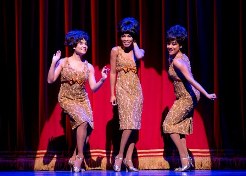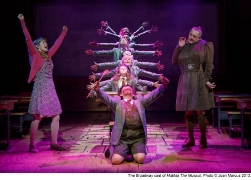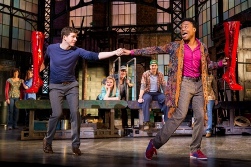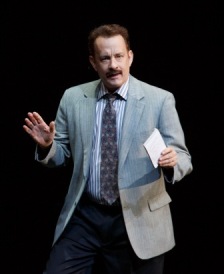Category: "Review"
Review: Betrayal
Oct 28th

Daniel Craig in Betrayal.
(Photo ©Brigette Lacombe)
That James Bond is being cuckolded nightly onstage at the Ethel Barrymore Theatre is the most startling aspect of the new revival of Harold Pinter’s Betrayal directed by Mike Nichols. One would have expected that the international sex symbol Daniel Craig would naturally play the role of Jerry, the literary agent involved in a year-long affair with Emma (Rachel Weisz), the beautiful wife of his best friend. Instead, Craig plays the hapless Robert, in a daring piece of casting made all the more piquant by the fact that his female co-star is also his real-life spouse, while British actor Rafe Spall, making a superb Broadway debut, plays the duplicitous interloper.
It would be nice to report that the production, representing a quick return to Broadway by Nichols after last year’s acclaimed Death of a Salesman, is a triumph. But this Betrayal feels curiously muted. It may be that the 1978 play, one of Pinter’s most popular and accessible works, simply hasn’t aged very well, with its famous gimmick of using reverse chronology to tell the story having worn thin through repetition (this is its third Broadway outing, not to mention the 1983 film version).
The concise 80-minute drama takes place in the course of nine scenes, beginning in 1977 and proceeding backwards through 1968. When the play begins, Robert is well of aware of his wife’s infidelity, spanning a period of five years during which she and her lover conducted their assignations in a flat rented specifically for that purpose. The ensuing scenes depict pivotal moments in the intertwined relationship, including Emma’s shocking revelation about the affair and her assurance to Robert that their child is indeed actually his. It culminates in a scene set nearly a decade earlier when an inebriated Emma and Jerry engage in their first torrid kiss during a booze-filled party.
As usual, Nichols has staged the proceedings with impeccable precision and visual handsomeness, accentuated by Ian MacNeil’s versatile sets which periodically descend from the rafters. Ann Roth’s costumes are perfectly in tune with the play’s ‘70s setting, as is Craig’s shaggy haircut, a far cry from his James Bond crew-cut.
But the play simply doesn’t pack the emotional punch here that it should. We never feel the necessary chemistry between the adulterous lovers, with Weisz in particular failing to convey the hungry passion that would explain her character’s ease in cheating on her husband for such a long period of time.
Craig, too, insufficiently portrays Robert’s rage and anguish at his betrayal at the hands of the two most important people in his life. Receiving the news that his wife has been sleeping with his best friend for half a decade, he barely reacts, maintaining an unflappable coolness. While this is partially the point, that these sorts of things are being handled with typical British reserve, we should see some hint of his pain. The actor admirably delivers a performance that reveals no trace of his Bond-style macho heroics, instead coming off as rather foppish. But there’s too little depth on display.
Instead, it’s Spall, whose father is the well-known British character actor Timothy Spall, who delivers the standout performance, displaying an arresting vivacity and emotional immediacy, especially in the climactic scene in which he wins Emma over via the sheer force of his passion.
Nichols has also added a homoerotic undercurrent to the proceedings, to negligible effect. Thanks to its star power, Betrayal is already a smash hit, with tickets nearly impossible to come by for its limited run. But audiences are likely to come away from this production feeling--if not exactly betrayed--at least confused as to what all the fuss is about.
Ethel Barrymore Theatre, 243 W. 47th St. www.Telecharge.com. 212-239-6200. Through Jan. 5.
Review: Motown: The Musical
Apr 14th

It’s a good thing that Motown: The Musical has the music of Motown to depend on. This self-serving musical documenting the rise and fall of the legendary Detroit music label was written by its founder, Berry Gordy, and it doesn’t exactly dig very deep. But it doesn’t really have to—not when it can deliver over fifty classics from an catalogue made famous by the likes of Diana Ross and the Supremes, the Jackson Five, the Four Tops, the Temptations, Marvin Gaye, Smokey Robinson and many, many others. Even before its opening, the show seems to have solidly established its hit status.
Basing the book on his autobiography—David Goldsmith and Dick Scanlan are listed far down in the credits as “Script Consultants”—Gordy delivers a portrait of Motown as a scrappy upstart label that revolutionized the music industry with its roster of amazing talents. That is, until it fell victim to the corporate behemoths that purloined his unfaithful artists by offering them barrels of money.
The show’s storyline begins and ends on the night of 1983’s 25th anniversary tribute concert in the Pasadena Civic Auditorium that reunited many of the label’s former stars, with Berry (Brandon Victor Dixon) brooding in the study of his Los Angeles home, refusing to take part.
Flashbacks then take us back to the beginnings of the label, housed in a small family home on a Detroit street. The choppy, episodic storyline follows Gordy as he discovers his growing stable of talent and nurtures them as they become superstars. Thus provides the opportunity for the large ensemble to deliver faithful renditions of Motown classics like “Ain’t Too Proud to Beg,” “I Heard It Through the Grapevine,” “My Girl,” “What’s Going On,” “Where Did Our Love Go” and dozens of others that are dear to baby boomers’ hearts. The score is augmented with four new songs co-written by Gordy and Michael Lovesmith that, while decent enough, mesh uneasily with the familiar hits.
The more dramatic if less engaging second act deals with such subjects as Gordy’s relationship with Diana Ross; Motown’s entry into the film business with her starring vehicle Lady Sings the Blues; his discovery of the Jackson Five and their precociously talented young lead singer; and eventually the defection of many of his artists.
Gordy portrays himself as an all-knowing and benevolent ruler of his musical empire, presenting only one example of weakness in a scene in which he fails to perform sexually with Ross. It’s a curious moment to dramatize, made more so by her reaction, which is to sing “I Hear a Symphony.”
Director Charles Randolph-Wright does what he can with the mediocre material, but the endless procession of dramatic scenes and musical numbers basically reduces him to the role of traffic cop. While at first it’s enjoyable enough to watch the ersatz Temptations, Four Tops, etc. go through their paces, the sheer volume becomes numbing.
Dixon and LeKae deliver strong portrayals of Gordy and Ross respectively, with the latter particularly amusing once the character enters her diva phase. Charl Brown is fun as the high-voiced Smokey Robinson and Bryan Terrell Clarke well conveys Marvin Gaye’s ever-shifting personas. At the performance caught, young Jibreel Mawry (who alternates in the role with Raymond Luke, Jr.) stopped the show with his impersonation of a pint-sized Michael Jackson, as well as the young Gordy and Little Stevie Wonder. The rest of the large ensemble--many playing multiple roles--goes through their paces with impressive professionalism.
Patricia Wilcox and Warren Adams’ choreography skillfully recreates the familiar moves of the Motown artists, while Ethan Popp’s musical arrangements are similarly faithful and also sound great thanks to the theater’s augmented sound system. But the real stalwart is the costume designer, Esosa, who superbly fulfills her assignment of creating hundreds of outfits spanning several decades of styles.
It’s sad that Motown: The Musical fails to live up to its considerable potential. But one thing is certain—you’ll go home humming the tunes.
Lunt-Fontanne Theatre, 205 W. 46th St. 877-250-2929. www.Ticketmaster.com.
Review: Matilda
Apr 12th

It’s getting to where you feel uncomfortable attending a Broadway musical without a little girl in tow. Joining the current tween-friendly line-up of Wicked, Annie and Rodgers and Hammerstein’s Cinderella is the new British import Matilda the Musical, based on Roald Dahl’s 1988 novel about a little girl possessing the gifts of a preternatural intellect and, like a pint-sized Carrie, telekinesis.
Having garnered endless raves and heaps of awards across the Pond, it looks likely to reap similar success here, even though its very British sensibilities may prove off-putting to some.
Despite the plaudits, the show proves yet another example of dazzling stagecraft applied to thin material lacking emotional heft. Although brilliantly staged by Matthew Warchus (last season’s Ghost: The Musical is now officially forgiven) and wonderfully performed by its ensemble including four young girls alternating in the title role and the superb Bertie Carvel reprising his Olivier Award-winning turn, this Royal Shakespeare Company production ultimately feels hollow.
The thin storyline revolves around five-year-old Matilda, who dazzles her peers and teachers with her polysyllabic vocabulary and voracious reading habits which include Dickens, Austen and Dostoyevsky (in the original Russian, no less). Less favorably inclined are her loutish parents, the Wormwoods (Gabriel Ebert, Lesli Margherita), who have little use for her, and her brutal headmistress Miss Trunchbull (Carvel, playing the role in drag), who physically and emotionally abuses her charges.
="“font-family:">On Matilda’s side are a kindly librarian (Karen Aldridge) who keeps her supplied with books in exchange for stories, and a supportive teacher, Miss Honey (Lauren Ward), who attempts to shield her from Miss Trunchbull’s venom.
Its positive message of youthful empowerment delivered through Dahl’s deliciously dark sensibility, Matilda is refreshingly free of the treacle afflicting so many children’s themed shows. Dennis Kelly’s book translates it effectively to the stage, and the peppy score by Australian comedian Tim Minchin features many clever lyrics, at least when you can hear them through the thin young voices and British accents. The production is certainly visually dazzling, especially Rob Howell’s set featuring endless miles of books and an explosion of Scrabble-like alphabet tiles that extends far beyond the stage. Also impressive is the inventive choreography by Peter Darling that features the young kids (and several adults) dancing with an energetic, Spring Awakening-style abandon. Important contributions are made by Hugh Vanstone’s lighting design, which at one point features a dazzling laser show, and Paul Kieve’s illusions, including such effects as words magically appearing on a chalkboard.
The acting, too, is terrific. At the reviewed performance, young Oona Laurence displayed the polish and finesse of a veteran trouper as Matilda. Ebert and Margherita are deliciously sleazy as the Wormwoods, and Ward is wonderfully appealing as the kindly teacher. Carvel, aided by Howell’s impressive costuming, is riveting as the grotesque Trunchbull, instantly establishing the character as one of theater’s most memorable villains.
But for all skillful effort involved, the show is never truly involving. The schematic storyline lurches forward to its predictably happy conclusion, and the telekinesis element seems tacked-on. Matilda the Musical is never boring, and it’s certainly impressive while you’re watching it. But for anyone old enough to drink or vote, it’s likely to evaporate from your mind immediately upon leaving the theater.
Sam S. Shubert Theatre, 225 W. 44th St. 212-239-6200. www.Telecharge.com.
Review: Kinky Boots
Apr 5th

Operating under the principle that Broadway simply isn’t Broadway without the presence of fabulously dressed drag queens strutting onstage, the new musical Kinky Boots has arrived to fill the void left by the closing Priscilla, Queen of the Desert. Adapted from the hit 2005 British film and featuring a book by Harvey Fierstein and a score by pop star Cyndi Lauper in her Broadway composing debut, the show is proficiently entertaining even if its established tropes seem all too familiar.
Set in the British town of Northamptonshire, the story concerns Charlie (Stark Sands), who inherits a failing shoe factory after his father dies. Although he initially has no interest in preserving the business, Charlie changes his mind upon meeting Lola (Billy Porter), a flamboyant drag queen who inspires him to change their product line to elaborately glitzy boots suitable for a male clientele.
While his shallow girlfriend (Celina Carvajal) encourages him to follow through on a plan to turn the factory into upscale condominiums, Charlie instead attempts to retool the factory, much to the consternation of his macho employee Don (Daniel Stewart Sherman) who has little use for Lola’s kind. Will Charlie manage to produce his new product line in time for an upcoming footwear exhibition in Milan? Will he find love with Lauren (Analeigh Ashford), the sexy factory employee who pines for him? Will Don overcome his prejudices and learn to both accept Lola for who he is and embrace Charlie’s scheme? Such are the not-so-burning issues of the schematic book, which nonetheless manages to work thanks to Fierstein’s talent for witty dialogue and his canny knack for pushing audience-pleasing emotional buttons.
Although her pop/rock score is largely generic, Lauper’s gift for infectious tunefulness is on ample display in such rousing numbers as “The Most Beautiful Things” and “Everybody Says Yeah.” She also provides sturdy 11 o’clock showpiece numbers for the two leads with “The Soul of a Man” and “Hold Me in Your Heart,” powerfully sung by Sands and Porter respectively. But the song that most registers within the context of the story is the witty lament “The History of Wrong Guys,” delivered in wonderfully endearing fashion by Ashford.
Director/choreographer Jerry Mitchell keeps things moving at an entertainingly brisk pace, and while the numbers spotlighting a quintet of glamorous drag queens feel straight out of La Cage Aux Folles he’s also devised at least one terrific dance sequence, incorporating the factory’s conveyer belt, that feels clever and original.
Although the performers occasionally struggle with their English accents, they deliver engaging performances, with Sands appealing as the suddenly fired-up Charlie and Porter—who’s covered this sort of ground before in such shows as the Angels in America revival—both funny and moving as the dignified, self-possessed Lola. Ashford is charming as the lovestruck Lauren, and Sherman steals the show as the stubbornly resistant Don, and delivers a hilarious pre-show cell phone warning as well.
And then, of course, there are the suitably outlandish titular creations designed by Gregg Barnes, which earn a well-deserved ovation when worn by the entire ensemble in the rousing closing number.
Al Hirschfeld Theatre, 302 W. 45th St. 800-432-7250. www.Telecharge.com.
Review: Lucky Guy
Apr 1st

Nora Ephron’s new drama concerns the legendary tabloid journalist Mike McAlary, and its Broadway production has the lurid charge and energy of a tabloid newspaper itself. Directed in breakneck fashion by George C. Wolfe and featuring a terrific performance by Tom Hanks in his Broadway debut, Lucky Guy is a wildly entertaining evening.
McAlary, who died of cancer at the age of 41 in 1998, had a hugely successful--if rocky--career in which he see-sawed among New York City’s tabloid papers. Famed for his columns dealing with the NYPD, he blew it on a story involving a purported rape victim that nearly derailed his career. His greatest triumph came shortly before his death, when he broke the Abner Louima story, about the Haitian immigrant who was sodomized by police officers. It won McAlary the Pulitzer Prize.
This story was a longtime passion project for Ephron, who began her writing career as a reporter for the New York Post. She tried unsuccessfully for years to make a feature film based on McAlary’s exploits, with this posthumous theatrical version premiering some nine months after her death.
The work’s cinematic roots are evident in its episodic structure, which covers the major events in the journalist’s life in whirlwind fashion. While the writing never achieves any real depth and is overly dependent on informational tidbits delivered via narration, it has a rollicking wit that helps compensate for its narrative deficiencies.
What pulls the evening together is Wolfe’s fast-paced, careening staging, for which he has assembled a first-rate cast of theater veterans playing such real-life journalistic figures as Michael Daly, Jim Dwyer, Jerry Nachman and McAlary’s longtime editors John Cotter and Hap Hairston. Among those delivering pungently entertaining turns--some in multiple roles--are Danny Mastrogiorgio, Peter Scolari (Hanks’ co-star on the hit sitcom Bosom Buddies), Courtney B. Vance, Richard Masur, Peter Gerety, Deirdre Lovejoy, Brian Dykstra and Christopher McDonald, with Maura Tierney as McAlary’s loving but long-suffering wife, Alice.
And of course, there’s Hanks, who effortlessly brings his likeable, everyman persona to the stage. Unlike so many film stars who flounder when they attempt to trod the boards, Hanks--who began his acting career at Cleveland’s Great Lakes Shakespeare Festival but hasn’t done any theater work in decades--fully projects the charisma and talent that’s made him one of the foremost screen stars of his generation. Conveying McAlary’s brash cockiness and later the devastating effects of a near fatal car crash and the cancer that eventually killed him, the actor delivers a rich, multi-faceted performance that has the audience eating out of the palm of his hand. A particular highlight is the scene in which he and Vance silently and hilariously depict the rapturous effects of a self-induced morphine injection.
The tawdry atmosphere of New York City in the 1980s and ‘90s is superbly captured in the projections by Batwin + Robin Productions, Inc., while David Rockwell’s minimal set designs effectively depict locales ranging from smoke-filled newsrooms to the Irish bar where the journalists gather to kibbitz in profane fashion and occasionally even break into song.
Broadhurst Theatre, 235 W. 44th St. 212-239-6200. www.Telecharge.com. Through June 16.